|
Connotations
by Denny Meyer:
conference notes on
Sexual Orientation and Military Preparedness
An International Perspective
Conference
at Georgetown University Law Center

Stuart O'Brien (Au), Patrick Lyster-Tidd, (UK), Michelle Douglas
(Canada), Avner Evan-Zohar( Israel), Mike Rankin
(US)
On
March 12th, 2008, several hundred people gathered at Georgetown University Law Center in
Washington DC to hear an international panel of active
and former service members from some of America's
allied nations where lesbian, gay, bisexual, and
transgender citizens serve openly in their
militaries. In addition to local law students
and policymakers, the audience included many former
and currently active American officers and enlisted
NCOs, yet not a uniform was in sight. The
purpose of the conference was to impart how
successfully the transition to full inclusion of
openly gay service was made in allied armed forces.
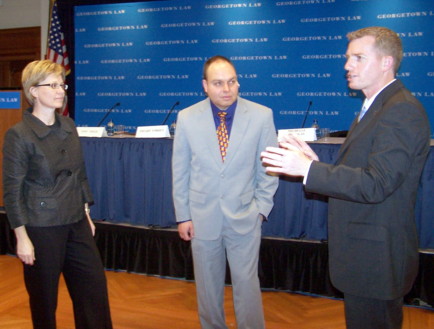
A
summary of the panel's presentations follows, briefly
outlining the process, in each nation represented, of
how they transitioned to fully affirming the right of
their LGBT citizens to serve. In future issues of Gay Military Signal, additional
articles will detail each nation's progression and how
that affected the lives of the speakers on the
panel. In brief, compared to the ongoing
perverse Don't Ask Don't Tell policy in the US
-now entering its 15th year-, these other nations had
relatively swift straightforward shifts to open
service along with legal recognition of the rights of
their LGBT patriotic volunteers.
OVERVIEW:
Beginning in the early 1990s, in the allied nations
described below (Australia, Canada, Israel, and the
United Kingdom), the respective parliaments
took into consideration their own national and or
international Human Rights laws and progressive
societal perspectives on the rights of homosexuals,
women, and minorities. After studies and or and
hearings and court cases in each country, the
parliaments, prime ministers, or military leaders
determined that there was no longer any justification
for continuing to ban or limit the service of
homosexuals in their armed forces. Following
that determination, the bans on homosexual service in
those countries were lifted, essentially without the
necessity of any major legislation. Although
respective senior military personnel and some
religious leaders did raise objections, the subsequent
experiences in these countries proved that concerns
about privacy, unit cohesion, recruiting and
retention, preparedness, and operational readiness
were overwhelmingly unfounded. The relatively
calm transition to open service by homosexual and
transgender volunteers in the militaries in these
allied countries is in stark contrast to the situation
in the United States where political ideology
continues to prevent the logical conclusion and
transition that those nations began to successfully
put into practice nearly two decades ago.
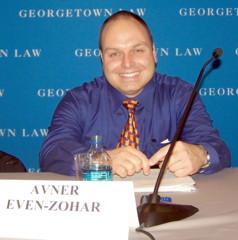 |
In
Israel, a nation surrounded by enemies sworn
to its destruction, being gay was never an
excuse in that every single able adult citizen
is needed in its defense force.
According to Capt. Avner Evan-Zohar (left),
gay service members were considered a security
risk during the 1980s due to the concern that
they could be blackmailed; so the policy at
that time limited them to lower rank and
security clearances during their mandatory
service. In 1993, amidst parliamentary
hearings on gay rights, poignant testimony was
heard from a former officer and research
scientist who had been a principle contributor
in Israel's most top secret national security
project. Under suspicion of
homosexuality, he'd been demoted to sergeant
and his security clearance was revoked.
Prime Minister Yitzhak Rabin realized the
absurdity of dishonoring one of the
nation's heroes. He essentially; |
| ordered
an end to the policy telling his top military
commanders that if they could not bring
themselves to follow orders to fully integrate
openly homosexual service members, he'd
find others who would. Rabin had been the
Chief of Staff of the Israeli Army during the
Six Day War and was previously the Commander of
Israel's elite Northern Command; and thus the
commanders of Israel's military had to respect his
authority and carry out the change. It
was noted that Israel was able to make this
transition despite being a conservative
country where religion and state are
interlaced, with a battle-hardened military
responsible for guarding a nation under
constant attack.
|
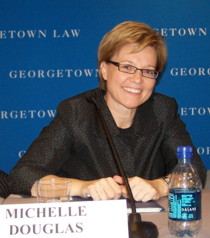 |
In
Canada, in 1989, Second Lieutenant Michelle
Douglas (left) was honorably dismissed due to
homosexuality. She subsequently sued
based on Canadian law which protects the
rights of its LGBT citizens. The
military settled the case by ending its
discriminatory policy. Ms. Douglas is, thus,
essentially single handedly responsible for
the entire change of policy regarding LGBT
service in Canada. The policy recognizes
the rights of transgender volunteers as well;
and encompasses
perhaps the world's most thoroughly inclusive
armed force affirmation of rights. In
Canada, it seems, there are no caveats or
exceptions nor pragmatic excuses or arguments
for exclusion. The
military has ongoing training regarding
respect and dignity and a policy of zero
tolerance for harassment. It is the
first nation to have held a same sex wedding
of uniformed military personnel. |
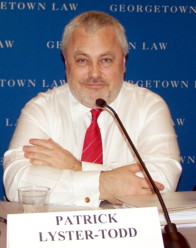 |
Lieutenant
Commander Patrick Lyster-Todd, Royal Navy,
retired, who served on active sea-duty and
shore-based assignments, described the five
year campaign to lift the ban on open gay
service in the United Kingdom. According
to his account, in the 1990s the Labor
Government had determined that there was no
justification for continuing to exclude
homosexuals from open service, but did not act
on that conclusion. The government
allowed a case to run its course through to
the final decision by the European Union Court
which required an end to the
discrimination. In 2000 the Defence
Secretary lifted the ban, without any
legislation, as the last element of a series
of reforms which prohibited racism, bullying,
hazing, and sexism, and affirmed the rights of
transgender and women volunteers. There had
been the usual sort of opposition to change
from retired senior officers and others.
However, their concerns about unit
cohesion, |
| retention,
preparedness and operational readiness were
demonstrated to have been unfounded.
When the issue of showers and privacy are
raised, Patrick Lyster-Todd notes the
military's new ethic that today's volunteers
risk their lives for the sake of their country
and freedom; their professionalism and
training do away with any discriminatory
inference that sexual orientation implies a
shortfall of integrity and decency. He
concluded by quoting Admiral Adrian John,
Second Sea Lord and the head of the United
Kingdom's Naval Personnel, who said that it is
unhealthy to lead a secret life.
Personnel need to be nurtured to give their
best and then be rewarded for their
efforts. Nurture includes the freedom to
be themselves. The mission is to break
down the barriers of discrimination,
prejudice, fear and misunderstanding.
Lyster-Todd
noted that change is difficult and required
enlightened leadership.
|
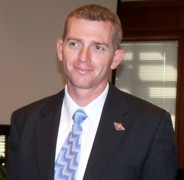 |
Out
gay Australian Navy Chief Petty Officer Stuart
O'Brien, who has served two voluntary tours in
Iraq, described the lifting of the ban against
homosexual service in the ADF. In 1992,
a government directive caused the Defence
Forces to issue new rules of behavior which
applied equally to heterosexuals and
homosexuals which essentially removed
discrimination against open service.
This was the culmination of a process begun in
the 1980s when Australia adopted international
human rights accords. The military had
initially resisted the change with the usual
objections and had tried to use the earlier
human rights legislation to exclude homosexual
service in the armed forces. Prime
Minister Paul Keating's order reflected |
| the
accepting nature of the Australian culture as
well as the attitude of younger military
personnel who also were willing to serve
alongside gay and lesbian service
members. In the years that followed, the
ADF has had an ongoing evolving process of
developing enhancements to assure
monitoring, education, training, equal rights privileges
such as the opening up of defence housing to
same sex couples in 2001-2002, and the
enabling of benefits for children of same sex
couples.
CPO O'Brien
has been instrumental in many of the
initiatives which have led to improvement for
LGBT service members, including the founding
of DEFGLIS,
a website of information and resources for
LGBT Australian military personnel, which has
been used by Defence for guidance on how to
implement progressive changes. While he
served in Iraq, his office became a safe space
for LGBT US troops to come and be heard.
CPO O'Brien received a US Meritorious Service
Medal for his work in Baghdad. |
Tom
Field, the conference Moderator, an adjunct
faculty member at Georgetown University Law
Center, is a retired US Army Colonel with 32
years service. Introducing the panel, he
noted that roughly 65,000 gay and lesbian
American troops on active duty are prevented
from serving openly. Under the DADT
policy, they may not say who they are; they
cannot carry a photo of a same sex partner nor
designate one to be notified in case they are
killed or injured in combat; thereby damaging
US military preparedness. Over 12,000
troops with critical skills, have been
discharged for violating the policy; the
equivalent of an Army Light Division.
41,000
qualified young Americans are dissuaded from
considering entering the military due to the
policy. And each year several thousand
highly trained officers and NCOs, the
equivalent of an Army Brigade, leave the
service rather than continuing to serve under
DADT.
The experiences of allied nations presented by
the panel, he said, can serve as a guide for
the US to enhance military preparedness in
allowing gay and lesbian troops to serve
openly. |
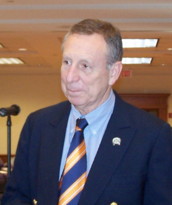 |
Retired
US Navy Captain Michael Rankin, an openly gay
advocate for the repeal of the Don't Ask Don't
Tell policy, served as Devil's Advocate at the
conference by presenting the views of those
opposed to the repeal of DADT. While
those opposed to the open service of gays in
the US military had been invited, no actual
opponents participated in the conference.
Some of the
opposing arguments are: the belief that
homosexuality is a terrible sin, unit cohesion
will suffer, younger men and women in the
military will be unnecessarily exposed to the
gay lifestyle, and the question, "how can
we ask our service members to add to the
stress of life on the battle field, in the
barracks and on ships by having them shower
with homosexuals?" |
| Religion
and values: Describing opposition based on
religion and values, Capt. Rankin quoted from
parts of a homophobic sermon: Homosexuals are
at it again to force our military to accept
practicing homosexuals. Having
homosexuals in a barracks is like having a
baby's dirty diaper on your dinner plate. Genesis,
states that God created Adam and Eve not Adam
and Steve. According to the Bible,
homosexuality is an abomination.
Those in favor of letting homosexuals serve
say that we should not use the Bible to make
decisions about or military. They tell
us that "your way of believing and
your values are not same as those of everyone
else, that all beliefs must be
respected. True, but, if they want us to
respect their values, why cant they respect
ours? We battle every hour of every day
against homosexuals and their allies who are
powerful.
Unit
cohesion: A Marine 06 speaking on Elaine
Donnelly's panel at the National Defense
University in Washington, in arguing
that
unit cohesion is important, said that he doubted that unit cohesion was
unaffected in militaries allowing gays to
serve openly. In any case, he argued,
"We are the USA, our young men are not
hanging out in bars in the Yorkville section
of Toronto, nor in the West End theaters of
London, nor prancing in women's clothing in
Sydney, they are not congregating on nude
beaches in Tel Aviv trying to pick up Israeli
soldiers. No, our military men are from
farm the farm towns of the Central Valley of
California, Cleveland, Atlanta, and Dallas,
and from small cities in the South and Midwest.
And they are aghast when told that they have
to sleep next to some flamer from Greenwich
Village or the Castro. They know they
have to watch their backs in the showers, so
they wont be assaulted.
It is stressful enough being in Iraq and
Afghanistan; why don't they deserve
better?" |
©
2008 Gay Military Signal
|